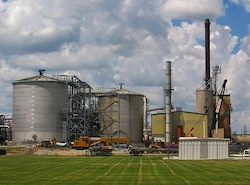Nebraska ethanol producers are responding to a tough market. With excessive drought conditions and nearly record high corn prices, ethanol producers have decreased their consumption in recent weeks. Latest estimates show the state’s ethanol plants operating at approximately 70 percent of capacity. This is a significant drop from 2011 when plants were running at 100 percent. In 2012, Nebraska ethanol plants produced more than 2 billion gallons.
“This slowing of production is a natural response to drought related market forces and will not preclude the industry from achieving Renewable Fuel Standard benchmarks,” said Steve Hanson, Chairman of the Nebraska Ethanol Board. “Higher than  normal ethanol stocks and a large number of existing RIN credits for U.S. refiners combine to make RFS standards achievable well into 2013.”
normal ethanol stocks and a large number of existing RIN credits for U.S. refiners combine to make RFS standards achievable well into 2013.”
Hanson has stressed what others in the industry have: that according to a study by Iowa State professor Bruce Babcock, a total waiver of the RFS would only reduce corn prices by less than 5 percent and cause only a 5 percent reduction in ethanol production. Livestock and poultry producers have been calling for a RFS waiver, but Hanson noted that dried distillers grains, a bi-product of ethanol production, are still an important and affordable feed option for animals.
“The RFS was created to reduce U.S. petroleum imports and it has done so very effectively,” continued Hanson. “In 2011, 14 billion gallons of domestically produced ethanol replaced 13% of oil imports and reduced the nation’s trade deficit by $50 billion. For the first time in decades, less than half of U.S. petroleum demand was imported. In addition, Nebraska motorists saved more than $50 million in fuel costs due to the lower price for ethanol fuels.”
Lastly, Hanson praised the ethanol industry for creating quality jobs and a more diverse tax base in small communities where many of the ethanol plants are located. A study conducted by Dr. Ken Lemke, chief economist at NPPD, says 7,700 Nebraskans are employed directly and indirectly as a result of the ethanol industry. State and local governments receive more than $50 million dollars in tax revenues and $250 million is added to household incomes in the state.

